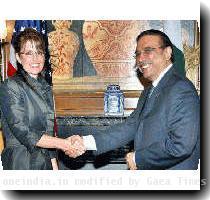Pakistani court tosses out amnesty that had covered president; his rule now under threat
By Zarar Khan, APWednesday, December 16, 2009
Pakistan court kills amnesty covering president
ISLAMABAD — Pakistan’s top court struck down an amnesty Wednesday that had protected the president from corruption charges, paving the way for challenges to his shaky rule just as the U.S. wants Islamabad to step up its fight against Islamist militants.
The main opposition party immediately called on President Asif Ali Zardari to resign, adding to the political turmoil in this nuclear-armed nation at a time of surging violence by the Taliban and al-Qaida. The U.S-backed president already is deeply unpopular and under pressure to give up much of his power.
The decision, which was widely expected, also leaves thousands of other officials, including Cabinet ministers and bureaucrats loyal to Zardari who had also been shielded by the amnesty, vulnerable to reopened corruption and other criminal cases.
“All the benefits given under the (amnesty) — cases withdrawn, acquittals made — are declared void,” Chief Justice Iftikhar Mohammed Chaudhry said in announcing the ruling of the 17-member bench.
Presidential aides said the government would issue a formal response after thoroughly reviewing the judgment. They pointed out that while he remains president, Zardari has immunity from prosecution.
The main opposition party, the Pakistan Muslim League-N, said Zardari should step down, though it insisted it was not agitating for midterm elections nearly two years after Zardari’s party won the majority in parliament.
“After the court ruling, Asif Ali Zardari should morally step down,” said Sadiqul Farooq, a PML-N spokesman.
Zardari aides scoffed at the notion.
“The president of Pakistan has no intention of stepping down from his office at this point or anytime in the future,” spokeswomen Farahnaz Ispahani said. “There is no constitutional or political reason for the president to resign.”
The amnesty was part of a U.S-brokered deal with former military ruler Pervez Musharraf that paved the way for former Prime Minister Benazir Bhutto to return home from self-exile and take part in politics without facing cases her party says were politically motivated. Zardari, Bhutto’s husband, took control of the party after Bhutto was assassinated in 2007.
The amnesty, known as the National Reconciliation Ordinance, had angered some civil rights activists and ordinary Pakistanis who said it protected the wealthy elite who govern the impoverished, corruption-plagued nation from being punished for their alleged crimes.
Despite his immunity from prosecution, Zardari’s opponents are now expected to challenge his eligibility for the post, arguing that if it were not for the amnesty he would not have been able to run for president. Analysts and legal experts are divided over whether this push will succeed, and the process is likely to take months.
Zardari was democratically elected and heads the largest party in parliament. Even some of his critics argue that stopping him midterm, something that would likely require a nod from the still-powerful army, would represent a set back to Pakistan’s transition to democratic rule after years of military government.
Zardari, 54, has long been haunted by corruption allegations dating back to governments led by his late wife, Bhutto. He spent several years in prison under previous administrations. He denies any wrongdoing, and the president’s office has declared the cases “unproven politically motivated allegations.”
The amnesty had been protecting Zardari from six graft cases dating to the late 1990s. One alleges he misappropriated $1.5 billion.
The court singled out an alleged money laundering case involving Zardari and his late wife that had been heard in a Swiss court until the attorney general under Musharraf withdrew proceedings against them as a result of the amnesty. Chaudhry said this was illegal and ordered the government to ask Swiss authorities to reopen the case.
Earlier this year, Zardari gave in to street protests and reinstated Chaudhry as the chief justice after he was fired by Musharraf. Many analysts took Zardari’s reluctance to restore Chaudhry as a sign he worried the judge would try to undermine him by reviewing the amnesty — a fear that appears to have come true.
“Zardari is in big trouble,” Pakistani political analyst Rasul Bakhsh Rais said late Wednesday. “He cannot really cover his flanks anymore. The defenses that he has built up around him have fallen one by one.”
The court decreed that the reopened cases against all those covered by the amnesty would be monitored by special judges and it asked the government “to offer every possible assistance required” to hear the cases. The Supreme Court said it would also monitor the cases.
Rais doubted, however, that Cabinet ministers and other politicians affected by the ruling would simply step down. He noted that investigative and prosecuting entities in Pakistan are essentially controlled by the government itself — making real justice for lawmakers potentially elusive.
“They will play all these tricks and they will stay in power,” Rais said, predicting many messy court battles ahead.
Ever since Zardari took over the presidency in September 2008, the opposition has demanded he give up sweeping powers he inherited from Musharraf. Pakistan’s original constitution envisioned a parliamentary system in which the presidency is a ceremonial role, but the balance of power shifted under Musharraf, who took power in a 1999 military coup.
A few weeks ago, amid mounting pressure, Zardari relinquished command of the country’s nuclear arsenal and said he would give up more powers soon. But that’s a promise he’s made before, including in a major speech to lawmakers just days after being sworn in.
The pressures on Zardari come as the U.S. needs Pakistan’s aid in the fight against the Taliban more than ever now that an additional 30,000 American troops are heading next door to Afghanistan.
The U.S. fears that unless Pakistan does more to crack down on militants on its side of the border, they will continue to find safe havens from where to plan attacks on American and NATO forces in Afghanistan.
Associated Press Writer Munir Ahmad contributed to this report.
Tags: As-pakistan, Asia, Asif Ali Zardari, Europe, Islamabad, North America, Pakistan, Parliamentary Elections, Political Corruption, Political Issues, Political Resignations, South Asia, Switzerland, United States, Western Europe

